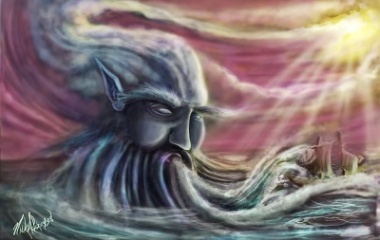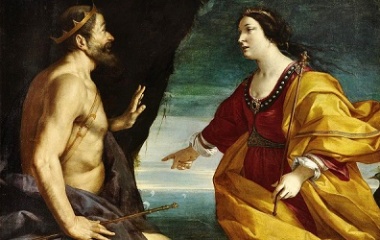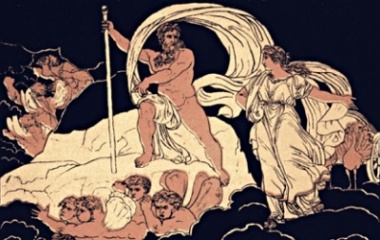- Pronunciation: ee-uh-luh-s
- Origin: Aeolia, Greece
- Role: Keeper of the Winds
- Symbols: Open bag, Aeolian harp
What is Aeolus?
The habitat of Aeolus was the mythical floating island of Aeolia. It was here that all of the winds were kept: stormy winds, gale force winds, and light breezes. The strongest winds were held in various caves on the island, waiting to be released by the command of Aeolus. The meaning of the name Aeolus is nimble – quite suitable for the “Keeper of the Winds”. He was assigned this task by Zeus, the King of the Gods. Although Aeolus is sometimes considered a mortal and otherwise known as a minor god, his legacy as the master of the winds holds to this day.
Aeolus also holds the title of Hippotades, which means “reiner of the horses”. The winds were thought of as horse-shaped spirits, controlled and contained by Aeolus.
Aeolus is infamous due to his part in Homer’s Odyssey. In Homer’s tale he was a mortal, not a god, but still charged with the duty of overseeing the winds.
Origin
Odysseus was on a journey struggling to get home to his wife and became lost at sea before he and his crew landed on the island of Aeolia. After a month on the island, enjoying the hospitality of Aeolus, the god kindly offered to assist Odysseus and his men to their destination by confining all of the adverse winds into a bag, and sending out the favorable soft wind of the west to push them safely toward home.
Once aboard the ship, while Odysseus slept, his suspicious crew of sailors concurred that he must be hoarding a variety of riches in that bag. Curious, they opened it and released all the uncontrollable winds. The winds swirled together and formed a powerful storm which carried the ship right back to Aeolia Island. Aeolus regarded this as a sign of the gods and advised the sailors to leave the island and never return.
Genealogy of Aeolus
The name Aeolus was given to three different characters featured in Greek Mythology. Their tales seem to overlap with one another, and at times, even the most distinguished mythographers have trouble telling them apart. Perhaps the easiest way to get started with understanding the complex genealogy is to distinguish by family tree, beginning with each of Aeolus’ mythical fathers.
Son of Hippotes
The best known Aeolus was originally a mortal, as depicted in Homer’s Odyssey as the Keeper of the Winds. This Aeolus was the son of Hippotes and the prophetic nymph Melanippe. Melanippe was the mother of Arne, the daughter of Poseidon and mother of Aeolus in other stories. Yes, it’s a little confusing – but for the purposes of the tale of the Odyssey, Aeolus’ parents were Hippotes and Melanippe. According to the renowned Greek Historian Diodorus, Aeolus had 12 children: six sons and six daughters.
Son of Hellen
Another Aeolus was the son of Hellen, the ruler of Aeolia and King of the Hellenes in northern Greece. His mother was the water-nymph Orseis of Thessaly (the later name of Aeolia), and his wife was Enarete. Aeolus and Enarete are considered the ancestors of the Aeolians. They are also fabled to have had numerous children, with the exact number still being debated.
Because his children met no one outside their own family, it has been said that Aeolus allowed his sons and daughters to pair with one another. The brothers drew lots for the sisters.
In other versions of the story, Aeolus did not approve of or allow incest between his children. Two of the siblings, Canace and Macareus were secret lovers, and Canace became pregnant by her brother. Macareus promised to marry her but never did. After their baby was born, the nurse tried to take the newborn away in a basket, but was caught in the act when the baby cried. Aeolus was furious when he learned about the baby and sent Canace a sword with which to commit suicide. In some versions of the story, Macareus kills himself too.
Son of Poseidon
The third Aeolus was the son of Poseidon, the god of the sea. The mother of this Aeolus was Arne, who was the daughter of the earlier mythological Aeolus and Melanippe. When Arne told her father that she was pregnant by Poseidon, he didn’t believe her and gave her away to a stranger named Metapontus. Arne later gave birth to twins, the third Aeolus and Boeotus.
There are two versions of the end of this story. In the first version, Metapontus adopted the twins but when they grew up, they had to leave the city because they killed Metapontus’ wife after a dispute. Boetus and Arne went to southern Thessaly (Aeolia) and Aeolus went to a group of islands in the Tyrrhenian Sea, which are now called the Aeolian Islands.
In the second version, poor Arne was blinded by her father when he found out about her pregnancy and he took the twins from her and abandoned them in the wilderness. A cow found the babies and fed them milk until some shepherds came along and took care of the boys.
Coincidentally, at this this time, the King of Icaria was angry with his wife, Queen Theano, because she hadn’t given him any children. He threatened to send her to exile. Out of desperation, she sent servants to find her a baby. They took the twins from the shepherds, and Queen Theano presented them to the king as her own. Oddly enough, the king didn’t question this, as he was just delighted to have two beautiful baby sons.
Eventually, Queen Theano gave birth to her own natural children. The king, however, always preferred the twins to the others. This made Theano quite jealous and worried about who would inherit the rule of kingdom. Once they were grown, she crafted a plot to send all of the children out to hunt together. Her natural children, who by now knew her secret, were going to kill the twins. Poseidon intervened and saved Aeolus and Boeotus, who ended up killing Theano’s other children. Upon hearing the news of their death, the queen committed suicide. Poseidon told Aeolus and Boeotus that he was their father, and their mother was being held captive by their grandfather. The twins killed their grandfather and set their mother free. Poseidon restored her vision and brought the whole family to Metapontus, who eventually adopted the twins and married their mother.
Historic Influence
The Odyssey is the second poem in Homer’s two-part epic tale. It is the story of the travels of Odysseus on his way back to his homeland of Ithaca after the Trojan War, and encompasses all the misfortunes and encounters he experiences along the way. The tale of Aeolus, the magical island, and the bag containing the winds is a well-known story in this very famous journey. It was originally written in Homeric Greek but continues to be translated into modern languages and read and enjoyed the world over. The island of Lipari, off the coast of Sicily, is identified with the magical Aeolia where Aeolus kept the winds.











When was this article published?
October 12, 2016